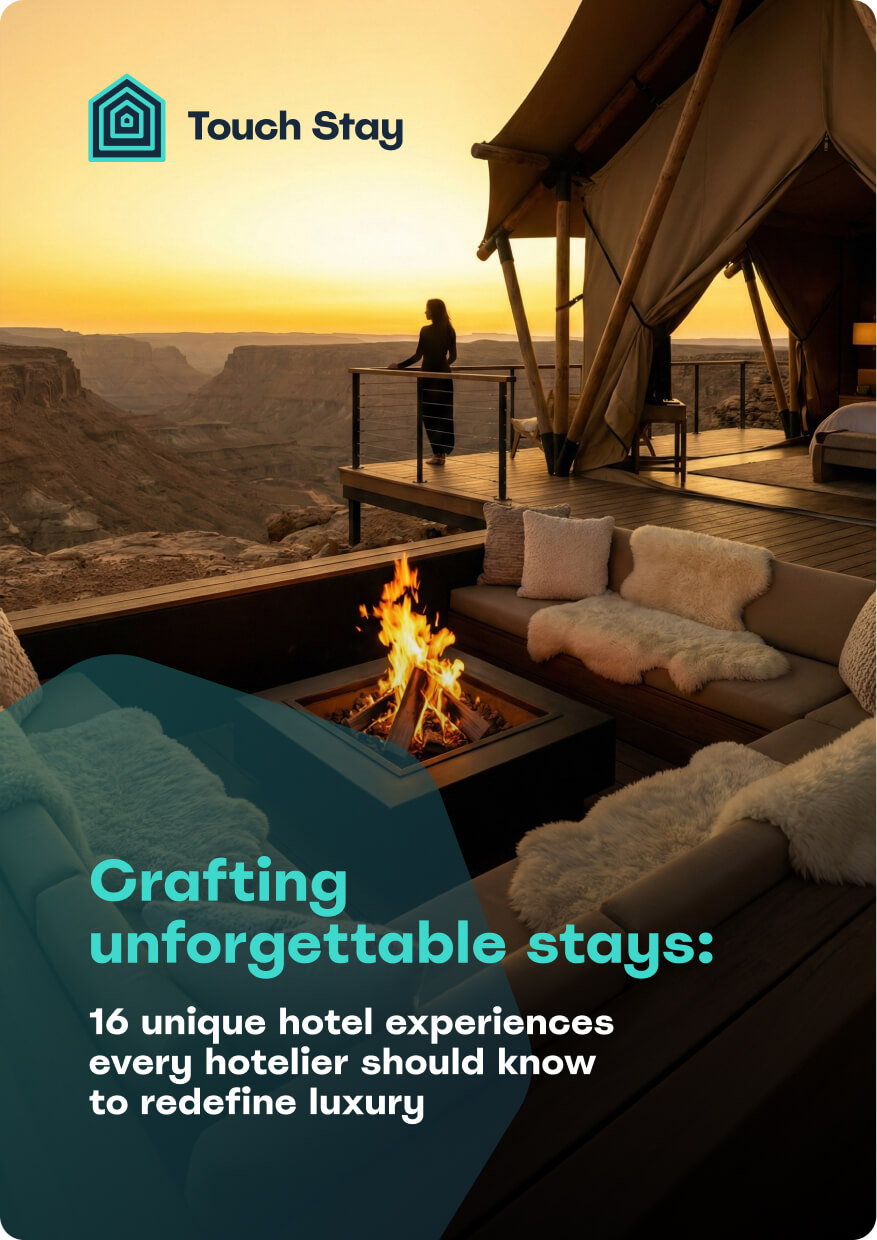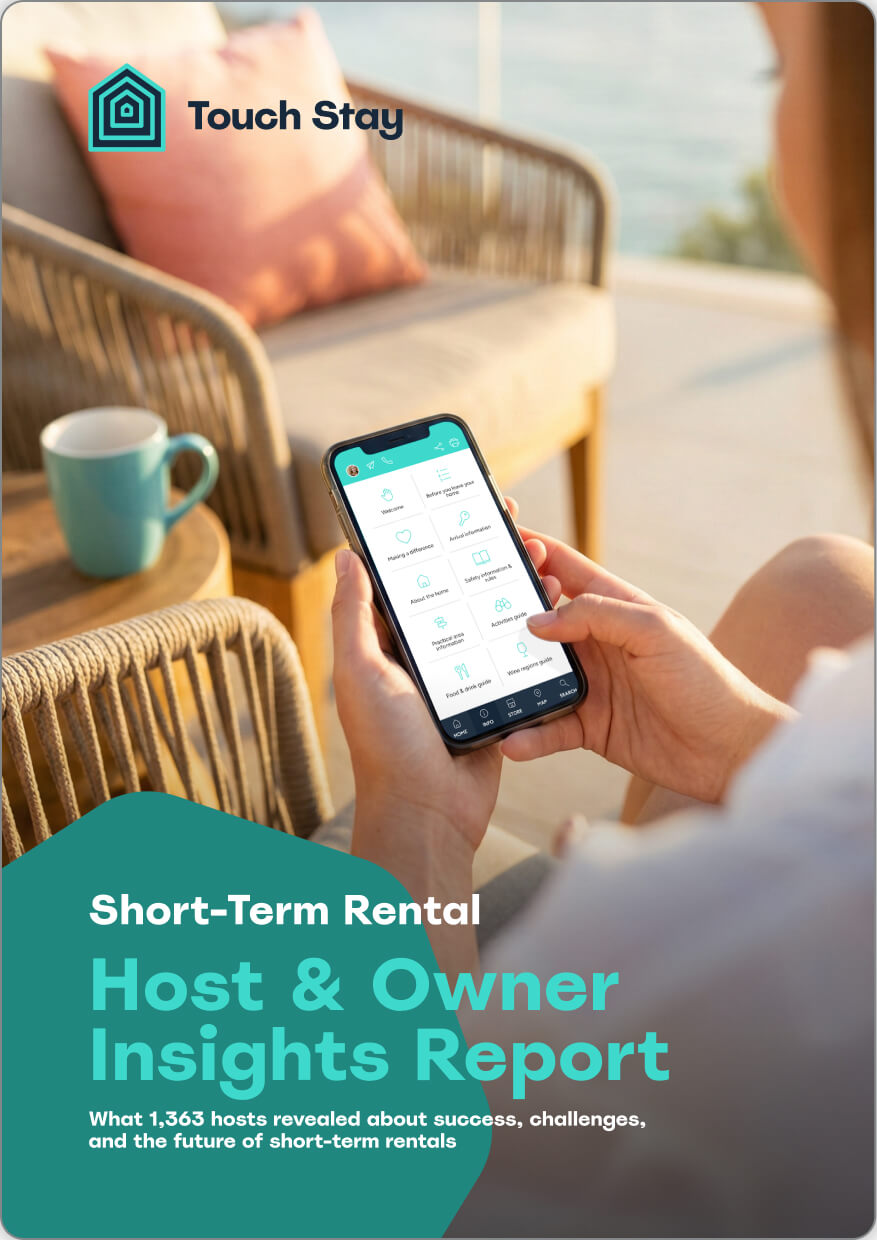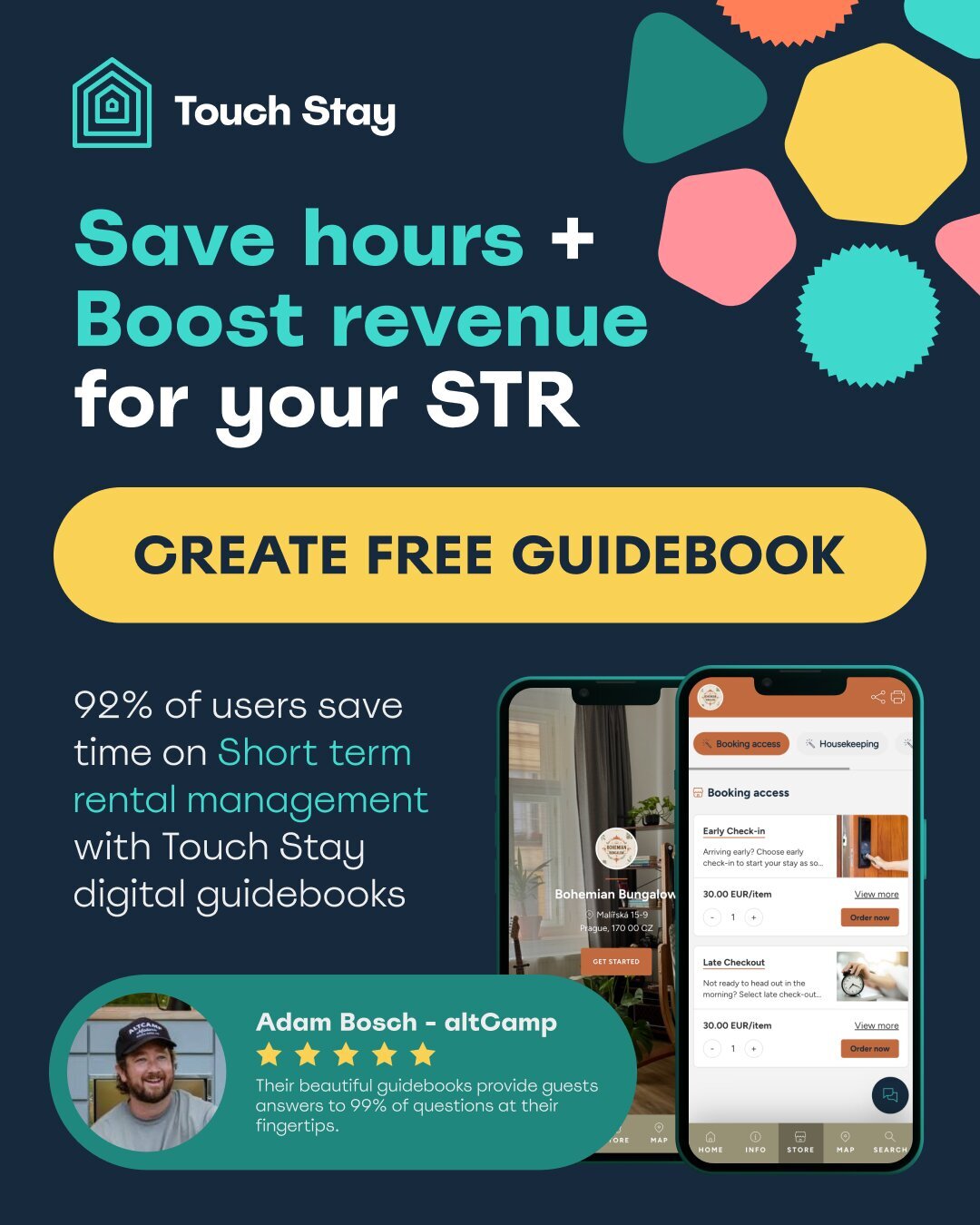The success of a hotel today hinges on more than just comfortable beds and a great location; it's built on a foundation of seamless, personalised communication. The modern traveller expects seamless, personalised and timely interactions from the moment they consider booking to long after they have checked out. This isn't just about answering questions; it's about building a relationship, fostering trust, and creating a memorable experience that guests will rave about. This ultimate guide will delve into:
- Why is communication in the hospitality industry important?
- Key channels in guest communication for hotels
- Best communication platform for hotels
- When and how to automate hotel communication using AI?
- Best practices and pitfalls in hotel communication
- How to measure success in hotel communication?
- Future trends in hotel communication
- Final thoughts
Start your journey to seamless hotel communication and elevate your guest experience with Touch Stay.
Why is communication in the hospitality industry important?
Communication is the lifeblood of any successful hotel. It’s the thread that weaves together every aspect of the guest journey, from the initial booking inquiry to the post-stay feedback. The way you communicate with your guests directly impacts their perception of your brand, their satisfaction levels, and ultimately, your hotel’s success.
Impact on guest satisfaction & reviews
Exceptional communication is a cornerstone of guest satisfaction. When guests feel heard, valued, and well-informed, their overall experience is significantly enhanced. Proactive communication, such as sending pre-arrival information or offering personalised recommendations, can set a positive tone for their stay. Conversely, poor communication, slow response times, inaccurate information, or a lack of clarity, can lead to frustration and disappointment, which often results in negative reviews.
Role in reputation management & direct bookings
In the age of online reviews and social media, a hotel’s reputation is more fragile and public than ever. Positive reviews, often driven by excellent guest communication, act as powerful social proof that attracts new customers. By contrast, negative reviews can deter potential guests and damage your brand. Effective communication also plays a vital role in encouraging direct bookings. When guests have a positive experience and feel a connection to your brand, they are more likely to bypass third-party booking sites and book directly with you, saving you commission costs and building a direct relationship.
Key channels in guest communication for hotels
The modern guest interacts with a hotel through a variety of channels, each serving a unique purpose at different stages of their journey. A successful hotel communication strategy involves leveraging the right channels at the right time to provide a seamless and cohesive experience.
Pre-stay: Email, SMS, chatbots
The pre-stay phase is a crucial opportunity to build anticipation and ensure a smooth arrival.
- Email: This is the most common channel for sending booking confirmations, welcome letters, and detailed information about the hotel and local area. It’s also an excellent medium for upselling, such as offering room upgrades or spa packages.
- SMS: For urgent or time-sensitive information, such as last-minute check-in instructions or a friendly reminder of an upcoming booking, SMS is highly effective due to its high open rates.
- Chatbots: Integrated into your website or social media pages, chatbots can answer frequently asked questions about booking, amenities, or directions, providing instant support and freeing up your staff.
In-stay: Mobile apps, SMS, WhatsApp, in-room tablets
During the stay, accessibility and responsiveness are key.
- Mobile apps: Many hotel groups offer dedicated mobile apps that serve as a central hub for guest communication. Guests can use the app for mobile check-in, to request services like housekeeping or room service, and to chat directly with staff.
- SMS/WhatsApp: Guests appreciate the convenience of being able to text staff with simple questions or requests. This direct and familiar form of hotel text messaging can feel less formal and more personal than a phone call.
- In-room tablets: In-room tablets can serve as a digital concierge, allowing guests to control room features, browse hotel services, and message the front desk. This can significantly reduce the need for phone calls and streamline service requests.
Post-stay: Surveys, feedback requests
The communication doesn’t end when the guest checks out. The post-stay phase is a valuable opportunity to gather feedback and nurture a long-term relationship.
- Surveys: Automated emails with a link to a feedback survey can provide valuable insights into what you did well and where there’s room for improvement. This information is critical for refining your services.
- Feedback requests: A simple follow-up email thanking guests for their stay and inviting them to leave a review on a platform like Google or TripAdvisor can help boost your online reputation.
This is also where a digital guidebook from Touch Stay can make a huge difference. By providing all the essential information in one accessible place, from check-in instructions to local recommendations, you can drastically reduce the number of guest questions, saving you time and enhancing their experience.
Best communication platform for hotels
Choosing the right technology is vital for a seamless hotel communication strategy. Here are some of the best platforms available, each with unique features to suit different needs.
1. Touch Stay
As a market leader in digital guidebooks for short-term rentals and hotels, Touch Stay is not a traditional messaging platform but a powerful communication tool. It allows hoteliers to create a digital, mobile-friendly guidebook that contains all the information a guest might need, from Wi-Fi passwords to local recommendations. By providing all this information upfront, hoteliers can pre-emptively answer common questions, significantly reducing guest inquiries and saving valuable staff time. The guidebooks can be sent via a simple link, making them easy to share and access.
- Key features: Create a comprehensive digital guidebook, integrate with PMS and booking software, multi-language support, custom branding, and analytics to track what guests are viewing.
2. GuestTouch
GuestTouch is an AI-powered platform that centralises hotel guest messaging across multiple channels, including SMS, WhatsApp, and social media. It features an AI assistant that can handle common inquiries, providing instant replies and freeing up staff to deal with more complex issues.
- Key features: Unified inbox for all messages, AI assistant for instant replies, automated messaging campaigns, review management tools, and integration with popular property management systems (PMS).
3. HiJiffy
HiJiffy is another strong player in the AI-powered communication space. It offers a sophisticated chatbot that can be integrated into your website, social media, and messaging apps. The chatbot can handle a wide range of tasks, from answering FAQs to processing bookings and upsells.
- Key features: AI-powered chatbot with booking capabilities, multi-channel integration, performance analytics, and a powerful back-end for managing conversations.
4. Alice
ALICE is a comprehensive hospitality operations platform that includes a robust guest messaging system. It allows guests to communicate with hotel staff via SMS or a mobile app, and staff can manage these conversations from a single dashboard. It also includes tools for managing staff tasks, making it a powerful solution for both internal and external hotel communication.
- Key features: Guest messaging across multiple channels, internal staff communication and task management, service request management, and a mobile app for staff.
5. Zingle
Zingle, now part of Medallia, is a popular guest messaging platform that focuses on creating exceptional guest experiences through SMS and other messaging channels. It allows hoteliers to send automated messages, engage in two-way conversations, and even manage service requests directly through text.
- Key features: Two-way messaging via SMS, MMS, and other channels, automated message campaigns, team collaboration features, and detailed analytics on guest engagement.
When & how to automate hotel communication using AI?
Automation and AI are no longer future trends; they are essential tools for managing hotel communications effectively. When implemented correctly, they can provide instant support, personalise the guest experience, and free up staff to focus on high-touch, in-person interactions.
Pre-arrival messaging: Check-in instructions, upsells
Automation is perfect for pre-arrival communication.
- Check-in instructions: A few days before arrival, an automated email or SMS can be sent with a link to a digital guidebook or a direct check-in portal. This ensures guests have all the necessary information, such as door codes or directions, well in advance.
- Upsells: AI can be used to analyse a guest's booking data and suggest personalised upsells. For example, if a guest is staying for a romantic weekend, the system could automatically send an email offering a bottle of champagne on arrival.
Pro tip: discover why pre-arrival guest communication matters
During stay: Automated replies, chatbots for FAQs
AI-powered chatbots are incredibly useful during a guest's stay.
- Automated replies: A chatbot can handle a significant portion of common inquiries, such as "What time is breakfast?" or "Can I have an extra towel?" It can provide instant, accurate answers 24/7 without requiring staff intervention.
- Chatbots for FAQs: For more complex questions, a chatbot can gather the necessary information and then seamlessly hand the conversation over to a human staff member, ensuring a smooth transition and a better experience for the guest.
Post-stay: Automated feedback and review prompts
Automation is also invaluable for post-stay communication.
- Automated feedback and review prompts: A few hours after check-out, an automated email can be sent thanking the guest and asking them to rate their stay. This can include a direct link to a survey or a review site. This not only gathers valuable feedback but also encourages positive reviews, which helps with your SEO and online reputation.
Best practices & pitfalls in hotel communication
While technology offers incredible opportunities, it's the human element and a solid strategy that truly make a difference. Here are some best practices and common pitfalls to avoid.
1. Timing, consent, tone and frequency
- Timing: Communicate with guests when it's most relevant to them. Don’t send a welcome email an hour before they arrive; send it a few days in advance. Likewise, post-stay communication should happen shortly after they leave to be most effective.
- Consent: Always get explicit consent before sending marketing or promotional messages, and ensure there's a clear opt-out option.
- Tone: The tone of your communication should be consistent with your brand. Is it friendly and informal, or more formal and luxurious? Whatever it is, ensure it’s consistent across all channels.
- Frequency: Avoid bombarding guests with too many messages. A single, well-timed message is far more effective than a constant stream of notifications.
Pro tip: check out our ultimate guide to guest communication: 13 essential notifications
2. Avoiding over-texting, ensuring privacy compliance
One of the biggest pitfalls of hotel text messaging is over-communication. Avoid sending multiple text messages for every small detail. Instead, bundle information into a single, comprehensive message. Always respect guest privacy and comply with data protection regulations like GDPR. Ensure your messaging platform is secure and that you have a clear privacy policy.
3. Keeping the human touch alive
Even with the rise of automation, the human touch remains the heart of the hospitality industry.
4. Balancing automation with personalised contact
The key is to use automation to handle the mundane, repetitive tasks, freeing up your staff to engage in meaningful, personalised interactions. For example, an automated message can provide directions to the hotel, but a staff member can personally welcome a guest and offer them a drink.
5. Ensuring 24/7 responsiveness without appearing robotic
Automation allows you to be responsive 24/7, but it's important that your automated responses don't sound cold or robotic. Use natural language and, when appropriate, let the guest know they can always connect with a human if they need more help.
Internal communication & staff coordination
Effective hotel communication isn’t just about guests; it’s about your staff too. Internal communication is the engine that drives your hotel’s operations. A streamlined internal communication system ensures that all departments, from housekeeping to the front desk, are on the same page. This leads to faster response times for guest requests, fewer mistakes, and a more cohesive team. Using a platform that allows for internal messaging and task management can be a game-changer for operational efficiency.
How to measure success in hotel communication?
To truly master communication in the hospitality industry, you need to be able to measure its impact. Here’s what to track.
Response times and guest satisfaction scores
Track how long it takes your team to respond to guest inquiries across all channels. Shorter response times generally lead to higher guest satisfaction. Monitor guest satisfaction scores and look for correlations between positive feedback and your communication strategies.
Tracking reviews and upsell revenue
Keep a close eye on your online reviews. Are guests mentioning your excellent communication? Are there common themes in the feedback? Also, track the revenue generated from upsell and cross-sell offers sent via your communication channels. This is a direct measure of your campaigns' effectiveness.
Regular feedback loops and improvements
Use the feedback you gather from post-stay surveys and reviews to continuously improve your communication strategy. This isn't a one-and-done process; it’s an ongoing cycle of listening, adapting, and refining.
Pro tip: discover more insights and innovations from our Guest Communication Study
Future trends in hotel communication
The landscape of communication in the hospitality industry is constantly evolving. Staying ahead of the curve is crucial for long-term success.
a) AI-driven conversational messaging
AI is becoming more sophisticated, moving beyond simple chatbots to truly conversational interfaces that can understand complex queries and provide human-like responses. This will enable hotels to offer even more personalised and seamless service at scale.
b) Voice assistants, self-service kiosks
Voice assistants like Amazon Alexa and Google Assistant are already making their way into hotel rooms. Guests can use them to control room features, request services, and get local information. Self-service kiosks will also become more prevalent for check-in and check-out, streamlining the process and reducing wait times.
c) Hyper-personalised guest journeys
The future of hotel communication will be hyper-personalised. Using data, hotels will be able to tailor every interaction to the individual guest, from their preferred room temperature to their favourite coffee order, creating a truly bespoke experience from start to finish.
Final thoughts
Effective hotel communication is a multifaceted discipline that requires a thoughtful blend of technology, strategy, and the irreplaceable human touch. By embracing modern communication platforms, leveraging automation wisely, and focusing on a guest-centric approach, hoteliers can not only meet but exceed the expectations of today’s discerning travellers. This will lead to increased guest satisfaction, glowing reviews, and a thriving business.
Ready to take your guest communication to the next level? Discover how a Touch Stay digital guidebook can save you time and enhance your guest experience…

Ned
Ned has clocked up over 11 years in digital marketing and comms, with a strong focus on creating engaging content for a range of brands and agencies. When he’s not writing, he can be found digging for records, peering through his telescope at the night sky, or onboard his local lifeboat where he volunteers as a crewmember.
Be the first to know!
Join our newsletter for early access to:
- ✅ Free guides
- ✅ Pro tips & tricks
- ✅ Time saving tutorials
- ✅ Latest blog posts
- ✅ Checklists & templates





















.webp?width=50)
.webp?width=50)